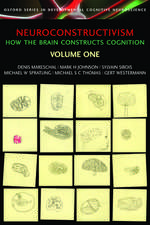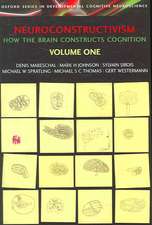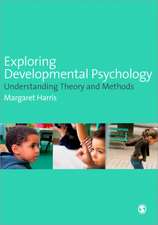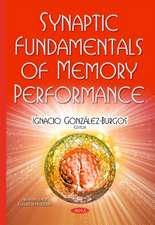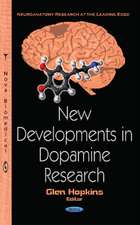A Student's Guide to Developmental Psychology
Autor Margaret Harris, Gert Westermannen Limba Engleză Hardback – 4 noi 2014
Guiding students through the key topics, the book provides both an overview of traditional research and theory as well as an insight into the latest research findings and techniques. Taking a chronological approach, the key milestones from birth to adolescence are highlighted and clear links between changes in behaviour and developments in brain activity are made. Each chapter also highlights both typical and atypical developments, as well as discussing and contrasting the effects of genetic and environmental factors.
The book contains a wealth of pedagogical features to help students engage with the material, including:
- Learning objectives for every chapter
- Key term definitions
- Over 100 colour illustrations
- Chapter summaries
- Further reading
- Suggested essay questions.
This book is essential reading for all undergraduate students of developmental psychology. It will also be of interest to those in education, healthcare and other subjects requiring an up-to-date and accessible overview of child development.
| Toate formatele și edițiile | Preț | Express |
|---|---|---|
| Paperback (1) | 343.09 lei 6-8 săpt. | |
| Taylor & Francis – 17 oct 2014 | 343.09 lei 6-8 săpt. | |
| Hardback (1) | 773.18 lei 6-8 săpt. | |
| Taylor & Francis – 4 noi 2014 | 773.18 lei 6-8 săpt. |
Preț: 773.18 lei
Preț vechi: 1032.68 lei
-25% Nou
Puncte Express: 1160
Preț estimativ în valută:
147.97€ • 154.08$ • 125.05£
147.97€ • 154.08$ • 125.05£
Carte tipărită la comandă
Livrare economică 10-24 martie
Preluare comenzi: 021 569.72.76
Specificații
ISBN-13: 9781848720169
ISBN-10: 1848720165
Pagini: 334
Ilustrații: 123
Dimensiuni: 189 x 246 x 20 mm
Greutate: 0.95 kg
Ediția:New.
Editura: Taylor & Francis
Colecția Psychology Press
Locul publicării:Oxford, United Kingdom
ISBN-10: 1848720165
Pagini: 334
Ilustrații: 123
Dimensiuni: 189 x 246 x 20 mm
Greutate: 0.95 kg
Ediția:New.
Editura: Taylor & Francis
Colecția Psychology Press
Locul publicării:Oxford, United Kingdom
Public țintă
UndergraduateCuprins
1. Framework and Methods 2. Theories and Approaches 3. Introduction to Infancy 4. Cognitive Development in Infancy 5. Early Language Development 6. Social and Emotional Development in Infancy 7. Introduction to the Preschool Years 8. Cognitive development in the Preschool Years 9. Language Development in the Preschool Years 10. Social and Emotional Development in the Preschool Years 11. Introduction to Middle Childhood 12. Cognitive Development in Middle Childhood 13. Literacy 14. Social and Emotional Development in Middle Childhood 15. Introduction to Adolescence 16. Cognitive Development in Adolescence 17. Social and Emotional Development in Adolescence
Recenzii
"This is a child development text that students will actually read. Rather than the standard textbook that is too heavy in more than one sense, this book presents key studies in developmental psychology in a manner that is as engaging as a detective story; just as science should be. As well as up-to-date and interesting information on all aspects of child development, A Student’s Guide teaches methodology almost surreptitiously, through its thoughtful critiques of studies, comparisons between competing interpretations and demonstrations of how new research paradigms can expand and modify previous work. The emphasis on the latest contributions to our knowledge of child and adolescent development through new techniques in neuropsychology, genetics and computer modelling make this very much a book of the 21st century, as does the resultant rebalancing of the nature-nurture debate to emphasise the importance of ‘nature in context’." – Susan Moore, Swinburne University of Technology, Australia
"This book is really refreshing in style and scope. It covers a large range of developmental science well. It presents developmental psychology as a scientific discipline and provides useful, current empirical examples, which students will appreciate. … It is very well-written and the material is interesting and useful. The authors have a friendly, engaging style. It reads like someone is telling you why developmental psychology is interesting and valuable over coffee (not like someone is lecturing you)." – Jessica Horst, University of Sussex, UK
"This highly topical text begins by asking the big questions in developmental psychology. Organized by age rather than topic, each chapter then proceeds to address the major questions and ideas in the field via the latest research with infants, children and adolescents. Key theories and study methods are made interesting and research is brought to life with good use of photos, figures, and stories." – Karen Waldie, University of Auckland, New Zealand
"This book will guide students of Developmental Psychology through the key theories and methodological approaches that have advanced our understanding of human development – from the prenatal stages to the challenges of adolescence. Students will find this a useful resource with a comprehensive and authoritative coverage of child development." – Deborah Riby, Durham University, UK
"This book provides students with a well-researched, well-organised introduction to current issues in developmental psychology. It is written in an engaging and thought-provoking manner that will get the reader reanalysing many of their previously-held opinions about current research in the field. In other words, precisely what you need to get students in the habit of questioning accepted dogma." — Nivedita Mani, Georg-August-Universität Göttingen
"A Student’s Guide to Developmental Psychology" offers fresh perspectives on theories of developmental psychology. The text navigates the various domains of human development – from infancy to adolescence – in the most comprehensive fashion. It contains abundant solid scientific evidence and presents alternative views from many great minds." — Li-fang Zhang, The University of Hong Kong
"One difficulty in teaching and learning about developmental psychology is that the discipline is very diverse. It includes sensation and perception, learning, memory, psycholinguistics, and most other areas covered in an undergraduate psychology course. There is also the added complication of having to introduce and understand the developmental bases of processes covered in each of those areas. Harris and Westermann make this task easier by interweaving a thematic approach within a chronological framework. From infancy to adolescence, Harris and Westermann skilfully introduced the major developmental events at each stage. Important topics, such as brain development, are discussed at each of the chronological period to ensure continuity. I particularly enjoyed the first chapter in which the authors laid out the major questions in developmental psychology and provided arguments for its relevance to issues of societal concerns. Many students read psychology because of its perceived relevance to a better understanding of human behaviour and of themselves. They are sometimes discouraged when they find out that much of that understanding is obtained through laborious studies and the use of careful statistical methods. Worse still, they have to learn those methods themselves! Harris and Westermann provide a gentle introduction to the discipline that helps demystify and, more importantly, reinforces the importance of the discipline." — Kerry Lee, National Institute of Education, Singapore
"This is a child development text that students will actually read. Rather than the standard textbook that is too heavy in more than one sense, this book presents key studies in developmental psychology in a manner that is as engaging as a detective story; just as science should be. As well as up-to-date and interesting information on all aspects of child development, A Student’s Guide teaches methodology almost surreptitiously, through its thoughtful critiques of studies, comparisons between competing interpretations and demonstrations of how new research paradigms can expand and modify previous work. The emphasis on the latest contributions to our knowledge of child and adolescent development through new techniques in neuropsychology, genetics and computer modelling make this very much a book of the 21st century, as does the resultant rebalancing of the nature-nurture debate to emphasise the importance of ‘nature in context’. – Susan Moore, Swinburne University of Technology, Australia
"This book is really refreshing in style and scope. It covers a large range of developmental science well. It presents developmental psychology as a scientific discipline and provides useful, current empirical examples, which students will appreciate. … It is very well-written and the material is interesting and useful. The authors have a friendly, engaging style. It reads like someone is telling you why developmental psychology is interesting and valuable over coffee (not like someone is lecturing you)." – Jessica Horst, University of Sussex, UK
"This book will guide students of Developmental Psychology through the key theories and methodological approaches that have advanced our understanding of human development – from the prenatal stages to the challenges of adolescence. Students will find this a useful resource with a comprehensive and authoritative coverage of child development." – Deborah Riby, Durham University, UK
"This book provides students with a well-researched, well-organised introduction to current issues in developmental psychology. It is written in an engaging and thought-provoking manner that will get the reader reanalysing many of their previously-held opinions about current research in the field. In other words, precisely what you need to get students in the habit of questioning accepted dogma." — Nivedita Mani, Georg-August-Universität Göttingen, Germany
"This highly topical text begins by asking the big questions in developmental psychology. Organized by age rather than topic, each chapter then proceeds to address the major questions and ideas in the field via the latest research with infants, children and adolescents. Key theories and study methods are made interesting and research is brought to life with good use of photos, figures, and stories." – Karen Waldie, University of Auckland, New Zealand
"From infancy to adolescence, Harris and Westermann skilfully introduce the major developmental events at each stage. Important topics, such as brain development, are discussed at each of the chronological period to ensure continuity. Many students read psychology because of its perceived relevance to a better understanding of human behaviour and of themselves. They are sometimes discouraged when they find out that much of that understanding is obtained through laborious studies and the use of careful statistical methods. Worse still, they have to learn those methods themselves! Harris and Westermann provide a gentle introduction to the discipline that helps demystify and, more importantly, reinforces the importance of the discipline." — Kerry Lee, National Institute of Education, Singapore
"A Student’s Guide to Developmental Psychology offers fresh perspectives on theories of developmental psychology. The text navigates the various domains of human development – from infancy to adolescence – in the most comprehensive fashion." – Li-fang Zhang, The University of Hong Kong
"This book is really refreshing in style and scope. It covers a large range of developmental science well. It presents developmental psychology as a scientific discipline and provides useful, current empirical examples, which students will appreciate. … It is very well-written and the material is interesting and useful. The authors have a friendly, engaging style. It reads like someone is telling you why developmental psychology is interesting and valuable over coffee (not like someone is lecturing you)." – Jessica Horst, University of Sussex, UK
"This highly topical text begins by asking the big questions in developmental psychology. Organized by age rather than topic, each chapter then proceeds to address the major questions and ideas in the field via the latest research with infants, children and adolescents. Key theories and study methods are made interesting and research is brought to life with good use of photos, figures, and stories." – Karen Waldie, University of Auckland, New Zealand
"This book will guide students of Developmental Psychology through the key theories and methodological approaches that have advanced our understanding of human development – from the prenatal stages to the challenges of adolescence. Students will find this a useful resource with a comprehensive and authoritative coverage of child development." – Deborah Riby, Durham University, UK
"This book provides students with a well-researched, well-organised introduction to current issues in developmental psychology. It is written in an engaging and thought-provoking manner that will get the reader reanalysing many of their previously-held opinions about current research in the field. In other words, precisely what you need to get students in the habit of questioning accepted dogma." — Nivedita Mani, Georg-August-Universität Göttingen
"A Student’s Guide to Developmental Psychology" offers fresh perspectives on theories of developmental psychology. The text navigates the various domains of human development – from infancy to adolescence – in the most comprehensive fashion. It contains abundant solid scientific evidence and presents alternative views from many great minds." — Li-fang Zhang, The University of Hong Kong
"One difficulty in teaching and learning about developmental psychology is that the discipline is very diverse. It includes sensation and perception, learning, memory, psycholinguistics, and most other areas covered in an undergraduate psychology course. There is also the added complication of having to introduce and understand the developmental bases of processes covered in each of those areas. Harris and Westermann make this task easier by interweaving a thematic approach within a chronological framework. From infancy to adolescence, Harris and Westermann skilfully introduced the major developmental events at each stage. Important topics, such as brain development, are discussed at each of the chronological period to ensure continuity. I particularly enjoyed the first chapter in which the authors laid out the major questions in developmental psychology and provided arguments for its relevance to issues of societal concerns. Many students read psychology because of its perceived relevance to a better understanding of human behaviour and of themselves. They are sometimes discouraged when they find out that much of that understanding is obtained through laborious studies and the use of careful statistical methods. Worse still, they have to learn those methods themselves! Harris and Westermann provide a gentle introduction to the discipline that helps demystify and, more importantly, reinforces the importance of the discipline." — Kerry Lee, National Institute of Education, Singapore
"This is a child development text that students will actually read. Rather than the standard textbook that is too heavy in more than one sense, this book presents key studies in developmental psychology in a manner that is as engaging as a detective story; just as science should be. As well as up-to-date and interesting information on all aspects of child development, A Student’s Guide teaches methodology almost surreptitiously, through its thoughtful critiques of studies, comparisons between competing interpretations and demonstrations of how new research paradigms can expand and modify previous work. The emphasis on the latest contributions to our knowledge of child and adolescent development through new techniques in neuropsychology, genetics and computer modelling make this very much a book of the 21st century, as does the resultant rebalancing of the nature-nurture debate to emphasise the importance of ‘nature in context’. – Susan Moore, Swinburne University of Technology, Australia
"This book is really refreshing in style and scope. It covers a large range of developmental science well. It presents developmental psychology as a scientific discipline and provides useful, current empirical examples, which students will appreciate. … It is very well-written and the material is interesting and useful. The authors have a friendly, engaging style. It reads like someone is telling you why developmental psychology is interesting and valuable over coffee (not like someone is lecturing you)." – Jessica Horst, University of Sussex, UK
"This book will guide students of Developmental Psychology through the key theories and methodological approaches that have advanced our understanding of human development – from the prenatal stages to the challenges of adolescence. Students will find this a useful resource with a comprehensive and authoritative coverage of child development." – Deborah Riby, Durham University, UK
"This book provides students with a well-researched, well-organised introduction to current issues in developmental psychology. It is written in an engaging and thought-provoking manner that will get the reader reanalysing many of their previously-held opinions about current research in the field. In other words, precisely what you need to get students in the habit of questioning accepted dogma." — Nivedita Mani, Georg-August-Universität Göttingen, Germany
"This highly topical text begins by asking the big questions in developmental psychology. Organized by age rather than topic, each chapter then proceeds to address the major questions and ideas in the field via the latest research with infants, children and adolescents. Key theories and study methods are made interesting and research is brought to life with good use of photos, figures, and stories." – Karen Waldie, University of Auckland, New Zealand
"From infancy to adolescence, Harris and Westermann skilfully introduce the major developmental events at each stage. Important topics, such as brain development, are discussed at each of the chronological period to ensure continuity. Many students read psychology because of its perceived relevance to a better understanding of human behaviour and of themselves. They are sometimes discouraged when they find out that much of that understanding is obtained through laborious studies and the use of careful statistical methods. Worse still, they have to learn those methods themselves! Harris and Westermann provide a gentle introduction to the discipline that helps demystify and, more importantly, reinforces the importance of the discipline." — Kerry Lee, National Institute of Education, Singapore
"A Student’s Guide to Developmental Psychology offers fresh perspectives on theories of developmental psychology. The text navigates the various domains of human development – from infancy to adolescence – in the most comprehensive fashion." – Li-fang Zhang, The University of Hong Kong
Notă biografică
Margaret Harris is Professor and Head of the Department of Psychology, Social Work and Public Health at Oxford Brookes University.
Gert Westermann is Professor of Psychology at Lancaster University.
Gert Westermann is Professor of Psychology at Lancaster University.
Descriere
This major new undergraduate textbook provides students with everything they need when studying developmental psychology.
Guiding students through the key topics against the latest findings on brain development and neuroscience, the book takes a chronological approach to developmental psychology by highlighting the key milestones at each age, making clear links between changes in behaviour and developments in brain activity. Each chapter also highlights both typical and atypical developments, as well as discussing and contrasting the effects of both genetic and environmental factors. It is accompanied by online supplementary resources, including a wealth of exclusive video clips to illustrate key developmental concepts.

